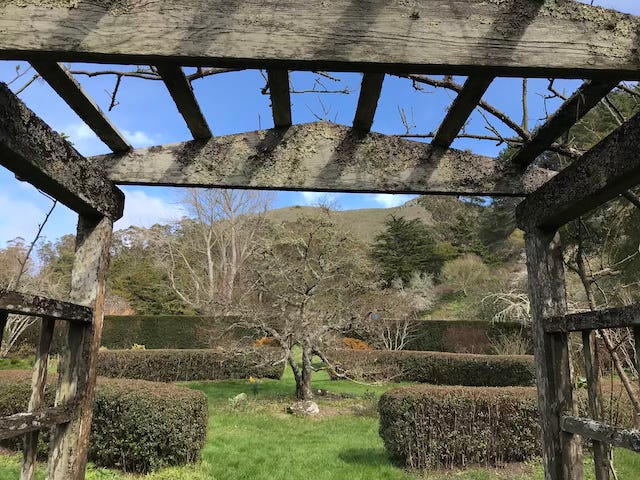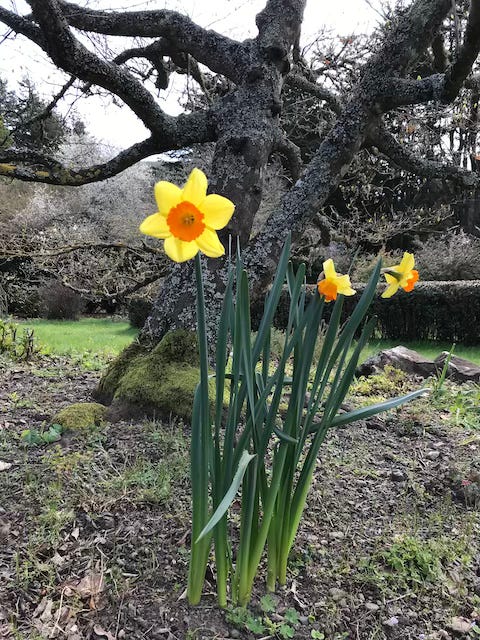Monk interrupted. That was a thought that arose numerous times during this past week while I meditated in the zendo, ate oryoki meals, and strolled along the paths at Green Gulch Farm. This past week I had the good fortune of dropping out of 9-to-5 time and into the boundlessness of a genzo-e sesshin. The wonderfully inspiring Kokyo Henkel Sensei led this genzo-e, which is a perfect blend of intensive meditation and studying a fascicle written by Eihei Dogen (the 13th century founder of Soto Zen in Japan).
The fascicle that we studied line-by-line was Shobogenzo Shinjin Gakudo, which translates as Treasury of the True Dharma Eye: Body-and-Mind Study of the Way. We used the translation from Kazuaki Tanahashi’s book Moon in a Dewdrop. One of my favorite quotes from this fascicle is:
“Everyday mind” means to maintain an everyday mind in this world or in any world. Yesterday goes forth from this moment, and today comes forth from this place. With going the boundless sky goes, with coming the entire earth comes. This is everyday mind.
We are never separate from our Original Face no matter where we are or what we’re doing. Even when we’re reading a comic book or sleeping, True Mind is awake.
If we are intent on waking up in this lifetime, it’s vital that we continue to study the Way on and off the meditation cushion. Below are some practices that might assist you with awakening your inner monk as you go about your everyday activities.
Follow the Schedule: In Zen speak, we call this the “container” of practice. Wholeheartedly following the monastery schedule gradually attenuates the sense of a separate self doing anything, including making simple choices about what time to wake up and what to eat. When we resist the tight container of the schedule our preferences are illuminated: “I don’t want to wake up at 3:50 AM.” “I don’t like amaranth for breakfast!” “I don’t want to sit next to this person in the zendo.”
It’s not that there’s anything wrong with having preferences, that’s just part of being human. However, the value of setting a schedule for yourself—or in corporate speak “time blocking”—is that it helps you notice your preferences and resistances. We often do not notice our likes and dislikes as we go through our day because there’s no container to illuminate them. For example, if you decide to incorporate meditation into your morning routine, you might hear a lot of voices telling you why it’s a waste of time or that there’s all these other activities that are a higher priority—like checking your emails or doom-scrolling. When we refrain from giving these voices our attention, they just float through mind consciousness like clouds in the boundless sky.
Resistance is Futile: If you stay at a monastery long enough, you’ll realize how much energy we waste resisting reality. For example, a simple thought such as “I wish it weren’t raining today,” is a harmless preference. However, when this preference is grasped, it can snowball into a world of misery that affects our mood and may spill out and affect how we treat others. Maybe we’re grumpy about having to walk the dog in the rain or drive to work in a downpour, etc. Thinking about how much we hate the rain, or the heat, or the driver who just cut us off, does not alter these circumstances. Often when there’s an experience of discomfort in the body-mind, it’s because there’s a preference that we’re holding onto that we might be unaware of.
One practice that can be helpful is to stop (if that’s possible) what you’re doing and be still for a few minutes and draw your attention to what’s going on in the body-and-mind. If you notice a physical constriction or dense emotion-sensation, that might be where the preference is being held. Sometimes just stopping and noticing helps alleviate the discomfort and shift your perspective about the circumstance so that you can just walk in the rain without frowning or forgive the driver who just cut you off.
To study the way with this body means to study the way with your own body. It is the study of the way using this lump of red flesh. The body comes forth from the study of the way. Everything which comes forth from the study of the way is the true human body. The entire world of the ten directions is nothing but the true human body. The coming and going of birth and death is the true human body.
MITs in the Morning: Whatever activities you consider are your most important things (MiTs), attend to them in the morning. During this genzo-e and while I lived at Tassajara Zen Mountain Center, we were on our meditation cushions in the pre-dawn dark sitting two periods of zazen with walking meditation in between. This was followed by a 30-minute service, oryoki breakfast, and then a period of study. These were our MMITS—monks’ most important things :>) For me, when I take care of what matters most in the morning, I feel more relaxed and more focused throughout the day.

Sit in the Dark: We usually meditate in the zendo with diffuse light which decreases visual stimuli and helps the body-mind settle. Because of the power outage, the zendo was pitch dark (and cold!) for the morning and evening meditation periods. However, for me, it was so much fun to sit in the dark and to listen to Kokyo’s talks while his body-mind slowly disappeared into the shadows. I felt like a kid again at sleep away camp—minus the bonfire and s’mores!
When we turn off the lights or close our eyes, our other sensory organs become enlivened because we’re not longer relying on our most dominant sense to literally see the world as it arises. Sitting in the dark affects how we perceive our bodies. Our sense of physical boundaries begins to soften and we feel less separate from the space that surrounds us, and a knowing arises that the wisdom that runs through all things includes us, the walls, floors, the person next to us, etc. This Awake Spaciousness suffuses all sentient and non-sentient beings. “It” is the Original Face before our parents were born.
When Eating, Just Eat: I learned this lesson the hard way. I was walking down the dirt path at Tassajara while eating a piece of bread slathered in peanut butter. I stumbled on a root or a rock and became one with the slice! At the monastery, one of the guidelines is “to sit down while eating and drinking.” Had I taken up this practice, I wouldn’t have had to spend time hand washing the PB off my shirt (as you might surmise, there are no washing machines and dryers at Tassajara).
When we practice just doing one activity wholeheartedly, there’s less chance there’ll be a sticky mishap. In Zen speak we call this “bringing zazen mind” to everyday activity. Focusing the wandering mind’s attention on just one activity reinforces the mindfulness that we practice while on the meditation cushion. During the genzo-e, we ate oryoki meals, which are the traditional monastic way of eating out of three nested bowls and in silence. Even though I eat much less food when eating this way, I always feel more satisfied afterwards because I focused on eating and not talking—which is no easy feat for this monk of Italian-American heritage ;>)
Expand Your Comfort Zone: Many of us live comfortable lives with modern conveniences at our fingertips: computers, dishwashers, washing machines and dryers, air conditioning, hot water, and electricity. It’s true that many of these ingenious inventions assist us in positive ways, however, we don’t usually notice how reliant we are on them for our peace of mind.


During the third day of the genzo-e, the power went out while we were eating oryoki lunch in the dining room. All the buildings, except for the one housing the kitchen and bakery, had no electricity for more than 24 hours. This meant that the small, electric fan heater in my guest room no longer worked and I had to sleep and wake up in the cold—something I was very familiar with from years living at Tassajara without hot water or heat in my cabin. However, I haven’t lived there since August 2020, so I had to monk up and just go where there is no cold. I just practiced over and over with dropping the thoughts of resistance (“I hate being cold.” “I wish PG&E would hurry up!” “How come there’s no central heat in the guest house.”)
It’s helpful to step out of our comfort zone and do things that we dislike or are fearful of, that put others’ needs ahead of our own, and that shake up our stories of how life should be. Take a cold shower instead of a hot one. Give more than you feel you can afford to your favorite non-profit or to a person living on the street. Visit a country where you can’t speak the language. Drop your opinions and actively listen to others’. Comfort & convenience are overrated!
Listen to the Trees: Taste the wind; smell the sunlight; touch the night; collect the heart-mind to see the Original Face.




I aspire to practice a version of the MIT way in my daily life; I experience it all as a much needed reminder to slow down and resist the conditioned impulse to rush - to wha and why, I often wonder? Then I catch myself rushing and have to re-remember. Thanks for the reminder! Which I read while catching myself eating my breakfast a little less mindfully than is wise. Alas, start again!
The only monk I follow is Thelonious.